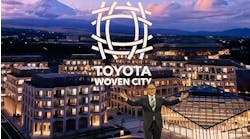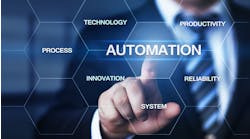Funds, factories and resilience in a time of crisis
This week, Bright Machines announced its Factory Resiliency Fund, a commitment up to $50M to help
Bright Machines' Amar Hanspal
new customers take advantage of no-upfront-cost automation. The program is designed to mitigate the financial challenges associated with Covid-19, enabling manufacturers to future-proof their factories and get businesses back on track sooner than later.
“With the challenges brought on by Covid-19, the need for responsive and resilient factories is greater than ever,” said Amar Hanspal, CEO, Bright Machines. “Getting factories back to work is our highest priority.”
The program, available immediately, allows Bright Machines Select customers to defer payments until 2021. Furthermore, Bright Machines will defer payment for the first three months after the solution passes a factory-site-acceptance test. Participation is subject to enrollment in a three-year Bright Machines Select contract for Bright Machines Microfactories.
We wanted to learn more, so we chatted with Amar. Take a look...
Smart Industry: What do you mean by "future-proofing" factories?
Amar: Future proofing refers to making factories resilient today for disruptions that will happen in the future. This includes making them flexible and scalable through smart automation. In order for manufacturing to become resilient and reshore factories, the industry must shift more of its operations from expensive, manual assembly to flexible and adaptable robots.
Smart Industry: How much of a deterrent is up-front cost in adopting smart automation initiatives?
Amar: Unfortunately, the demand for automation comes at a time when businesses have been undermined by not only disruptions in their supply chain, but also with less predictable forecasts for future product demand. In this environment, cash is constrained and few companies are willing to undertake any capital expense unless backed up fully with customer orders.
Smart Industry: How have business owners responded to your offer?
Amar: We’ve only begun sharing our commitment and fund in customer conversations in recent days. We’ve been pleased but not surprised by the response. Overall, interest in Bright Machines and what we are doing for factories has tripled in recent months compared to just a few months ago. No surprise, given the disruption brought on by COVID-19.
Smart Industry: What does the future of smart manufacturing look like as we work through this crisis?
Amar: Even before the coronavirus crisis, production lines were facing challenges associated with high demand, labor shortages and geo-political challenges. It has become clear that manufacturers need to move away from traditional analog-operational models, where production takes significant and costly time to set up on a line and requires constant tweaking or adjustment by experts with tribal knowledge of manufacturing processes. To minimize the impact of economic disruption, manufacturers need to operate in a new paradigm. This new version of manufacturing is fully data-enabled and software-driven to deliver an automated solution that provides the resilience to cope with disruption and the agility to react and adapt when that inevitable disruption occurs.





